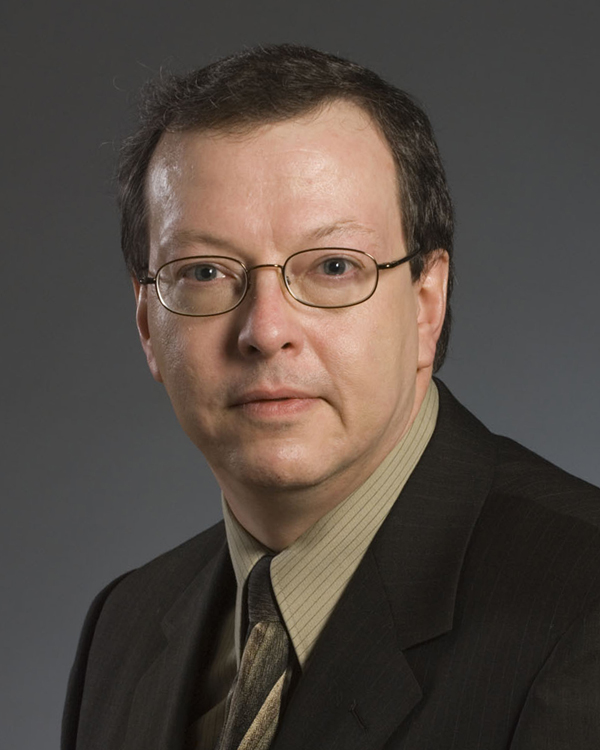Making a difference: Provost's Academic Address 2012
As the University of Saskatchewan approaches the milestone of a one-billion-dollar budget, Provost and Vice-President Academic Brett Fairbairn used his fourth annual academic address to explore whether universities provide value for that level of investment by making a positive difference in the world. And his conclusion was an unequivocal yes.
By Colleen MacPherson How are people's lives changed because of the distinct things that a university like ours does? asked Fairbairn at the start of his address entitled What Difference Do Universities Make? delivered Feb. 9 in Convocation Hall. Describing universities as "the key social institution of our times," the provost argued universities and the ideas they generate shape society and produce the people who influence the debates that matter – "Knowledge as power; self-governing service to the public interest."
How are people's lives changed because of the distinct things that a university like ours does? asked Fairbairn at the start of his address entitled What Difference Do Universities Make? delivered Feb. 9 in Convocation Hall. Describing universities as "the key social institution of our times," the provost argued universities and the ideas they generate shape society and produce the people who influence the debates that matter – "Knowledge as power; self-governing service to the public interest."Universities exist in a dynamic time of competing and changing perceptions and expectations, he said. As a result, there are those who believe the institutions have moved away from what has traditionally been viewed as the ideal. The first view the provost addressed is that universities are the preserve of the privileged, "or alternately, that we've been inundated by the mediocre masses."
The connection between universities and privilege is an old one based in truth, he said, "and goes back to a day when it was undoubtedly true." Another old idea is that diverse enrolment dilutes standards. By defining learning outcomes for students and by strategically managing enrolment, universities can address "the kernel of truth in concerns about quality and access."
The suggestion universities are not fulfilling their role because of corporatization was the second view the provost addressed. He acknowledged that universities, by necessity, have features of corporations – specialized staff, professional financial management, strategic planning – but these are features of all modern organizations, "selective adaptations that are appropriate to our times and circumstances." Both universities and penitentiaries have locks on their doors but that does not make a university a prison.
"Our not-for-profit orientation toward the public interest, combined with openness and plurality of purposes and stakeholders, gives a university an inner life that is distinctly different from any other kind of corporation."
Then there is the suggestion universities have become less democratic, but Fairbairn argued democracy "will never be achieved fully. It is an ideal." Democracy is not, he went on, "everybody voting on everything all the time" but rather a set of values based on respect for the dignity of all, values mirrored by the search for knowledge in higher education. "In that sense, the university is a fundamentally democratic institution."
The provost then moved on to the modern idea that universities neglect students in favour of research. He pointed out that teaching and research are necessary complementary activities, "and we need to arrange our time to include both of them." While there is no evidence students are being ignored, Fairbairn advocated for paying more attention to innovation in teaching.
Finally, Fairbain turned to the view that universities have become too expensive for society to sustain, a notion that has grown from issues like out-of-control health-care costs, economic downturns and Canadian academic salaries that are among the highest in the world.
Universities require immense resources and "I see no way around four tasks in our near future," he said. Included on that list of tasks is focusing resources "on those few chosen things that are most important," economizing, diversifying sources of revenue and ultimately, remaining reliant on huge levels of public support. "We will need to justify that support by showing the ways in which a university like ours continually makes an impact on people."
At their heart, universities are about ideas that transform lives, said Fairbairn, returning to his initial question, and at the core of that notion are creativity and "the transformative effect on society."
Understanding the ancient idea that knowledge is power, Fairbairn said that "like many universities, we have done too little to create a pervasive culture of creativity, and we have particularly done too little to document and explain the external impact of what we do."
That said, he mentioned several success stories connected with the U of S, life- and society-altering work in agriculture, vaccine development, human reproduction, history, law and other disciplines. "Our university prominently features established, signature areas of research that have been inspired by Saskatchewan realities and in which this province can make a global contribution."
Success also comes in the "spirit of discovery" U of S graduates take with them into the world. "It should not surprise us that people who have undergone a challenging education do better in life, in aggregate, in every measurable way," and a university education "prepares them to transform communities."
Universities make a difference, Fairbairn concluded, but the institutions must be aware of their responsibilities. Other organizations like governments, corporations and even communities depend on universities for leadership, expertise and ideas, but universities will never be without their skeptics and critics. Listen carefully, but do not "simply accept their prescriptions," he advised.
"We have the responsibility together to decide what being a university means in today's context. In an age when knowledge, more than ever, is power, we should not shrink from our mission both to create knowledge and to democratize it."
The complete text of Brett Fairbairn's 2012 academic address along with a video can be found on the provost's website.

